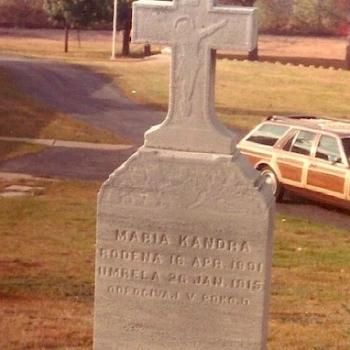“Who is my neighbor?”
We look around this morning and see those around us in the pews, and we know them. We see them on the street. We pass them in the grocery store. We wait with them in line in the bank. Maybe they live in our building, or we see them every morning on the subway. We recognize them. These, we tell ourselves, are our neighbors.
But the message of this Gospel parable tells us something shocking. It tells us: sometimes our neighbors are those we do not recognize – sometimes, even, those we don’t want to recognize.
“Who is my neighbor?”
My neighbor is not defined by geography, or zip code. My neighbor doesn’t necessarily shop at Key Food, or ride the subway with me to work. He doesn’t necessarily live on my street.
He may live in my street.
He may live in the subway.
Or he may not even be someone who speaks my language, or shares my culture. He may live in a cell at Rikers or a cage in Texas or a shelter in the Bronx.
But he is my neighbor.
Because he is also, like me, a child of God.
And the scripture asks me to love him as I love myself.
For the last few weeks, in Luke’s gospel, Jesus has been asking us to do things that seem impossible. He’s told his followers to let the dead bury the dead, and just last week, he told them to take nothing with them, not even sandals, as they spread the gospel message.
And now he is asking them – and asking us – to love those we do not know, to see in the faces of the poor, or the lost, or the hungry, or the alien…a neighbor.
He is asking us not only to care for those who cannot care for themselves – like a man beaten by robbers by the side of the road – but even to care for those who are not at all like us.
Who is my neighbor?
The fact is: my neighbor…is everyone.
Thomas Merton put it another way. “Our job,” he wrote, “is to love others without stopping to inquire whether or not they are worthy. That is not our business and, in fact, it is nobody’s business. What we are asked to do is to love.”
That is challenging enough. But there is a second challenge in this parable that I would submit is even harder. It is accepting and understanding the person who is the protagonist, the one who gives this parable its name.
The Good Samaritan.
In Jesus’ day, Samaritans were scorned. The Jews would have nothing to do with them. They considered them heretics. They shunned them and would even go out of their way to avoid traveling through their territory. The idea that a Samaritan would be good, and do good, was unthinkable.
Yet in this parable, Jesus taught that it was this despised person, this Samaritan, who knew, truly, how to see beyond differences. He knew who his neighbor was. And he knew how to care for him.
With compassion. With mercy.
With love.
The Samaritan was the only one who saw in that broken and abandoned shell of a man a human being endowed with dignity. And he wanted to see that dignity restored.
What this tells us is that sometimes, the one we may dislike or disagree with or even despise — the one we judge as unfit or unworthy or a heretic — is the one who shows us the way.
That sounded incredible to people in first century Palestine — and it sounds incredible to us today. We live in a fractured, polarized, intolerant society. How often do we make snap judgments about others because of their race, gender, religion or political affiliation? How often do we decide someone’s value by where they live, how they pray or what political candidate they support? How often on social media do we see people mocking anyone who is not like them?
One of the lessons of this parable is: don’t.
Sometimes it is the Samaritan among us — the one least like us, the one we might consider least worthy of time or attention or respect — who puts the rest of us to shame.
Sometimes, it is that person who can show us, with a startling clarity, what it means to be a neighbor to another.
Our prayer today is that all of us can fulfill that mandate, can see one another with the eyes of that Samaritan, and can live with the heart of one who loves beyond boundaries, beyond categories.
Because ultimately, I think, that is how God sees us and how he loves us. He sees beyond how we identify ourselves and each other. He loves us in spite of our differences — because we are his, made in his image.
And what does he do?
When we are wounded and hurt, he stops by the side of the road, and gives comfort.
When we have been stripped and beaten, he bandages our wounds.
When we cannot stand, he lifts us up and carries us.
God stops when no one else will. And so should we.
We are challenged with this Gospel to be neighbors to one another, as the Samaritan is neighbor to the wounded man by the side of the road, and as God is neighbor to us.
Christ’s final words in this passage call on us to remember that, and to live that, as we leave this church, and leave the neighbors that we know, and encounter the neighbors that we don’t know.
These may be the four most difficult words in the Gospel.
But this is our calling as Christians.
“Go. And. Do. Likewise.”













